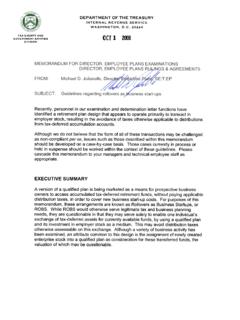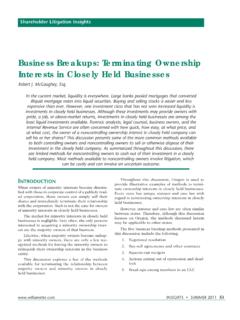Transcription of An Introduction to Business Valuation
1 An Introductionto BusinessValuationTM Capital Valuation Group, Inc. An Introduction to Business Valuation Page 1 ntroduction to Business Valuation If you own stock in a public corporation, you can readily determine its value by going to The Wall Street Journal and finding the price at which the stock is trading. However, if you own stock in a closely held corporation, you have no market reference to determine the stock's value.
2 How can you determine the value of your closely held stock? The process Capital Valuation Group follows in valuing the stock of a closely held Business applies many of the same procedures used by the securities analyst and sophisticated investor in establishing the trading range for a publicly owned , in most instances, there is no actual market transaction to test the value determined for the closely held security. What are these procedures for establishing the value of a closely held security, and how can you be sure if the value determined is reasonable if there is no actual transaction gains which to test value?
3 The successful Valuation of a closely held security requires: determining the proposed use of the Valuation option defining the meaning of the term "value" which is appropriate for the proposed use of the opinion analyzing and pricing the Business enterprise underlying the closely held security being valued analyzing and pricing the specific block of securities being valued. This publication is meant to be an Introduction to the Valuation of closely held businesses and their securities, not a comprehensive course in how to value a Business .
4 The professional discipline of Business Valuation is a dynamic one. The theory of Valuation is constantly being analyzed and modified. This publication will be updated as new theories emerge and old ideas are modified. I Capital Valuation Group, Inc. An Introduction to Business Valuation Page 2 etermining the Use of the Valuation Capital Valuation Group values closely held securities for many different reasons.
5 For example, Someone is interested in buying all the outstanding stock of a closely held corporation. How much should the buyer pay for the stock? The owner of all the stock of the same corporation is getting divorced. The stockholder is also the president and key employee of the corporation. What is the value of this stock for purposes of the corporation? What is the value of this stock for purposes of dividing the marital estate if the stockholder is going to continue owning and operating the Business after divorce? An individual dies owning all the stock of the same corporation.
6 What value should be placed on this stock interest for purposes of filing an estate tax return? Since all of these situations deal with stock of the same corporation, isn't the value of the stock the same in all three instances? No! More Than One Correct Value A "real world" buyer of a closely held Business must value both the Correct Value benefits of ownership under its own plan of operation and the benefits of continued ownership to the seller in order to form a fundamental pricing strategy to begin purchase negotiations. The "legal world" of hypothetical transactions and values attempts to simulate real world events under the guidance of special definitions of the term "value" developed from statutes and case law history.
7 These special definitions develop as judges and juries seek fairness and equity for the parties at odds over estate taxes, divorce, shareholders squeeze-outs, and condemnations. D Capital Valuation Group, Inc. An Introduction to Business Valuation Page 3 efining the Term Value The value of a closely held security is commonly considered its fair market value.
8 "Fair market value" has been defined as the cash (or cash-equivalent) price at which the security would change hands between a willing buyer and willing seller, neither being under any compulsion to buy or sell and both having reasonable knowledge of relevant facts. The purpose for the Valuation affects the value conclusions by its characterization of the willing buyer and seller in this common definition. The characterization of the willing buyer and seller is important because different buyers and sellers assign different values to a Business and its securities.
9 A "real world" buyer would assign a higher value to a Business or its securities if that Business were a good fit with the buyer's current Business . In this way, the "best fit" buyer both increases the benefits and reduces the risk of the Business investment opportunity. On the other hand, a buyer who had no similar Business , did not want to manage the Business purchased, and was concerned about the lack of liquidity in owning a closely held security would pay far less for the same Business or its securities. This buyer would pay less because the risks are so much greater than they are to the "best fit" buyer.
10 The chart on the next page is one Capital Valuation Group uses to illustrate the different relative values that would be assigned to a Business enterprise by different types of buyers. D Capital Valuation Group, Inc. An Introduction to Business Valuation Page 4 Prospect Ranking Chart Buyers of a Business Enterprise (A Generalization About Relative Value) Highest Enterprise Value 9 Strategically Positioned Business in the same industry or market which would employ their own Business plan to: 1.






